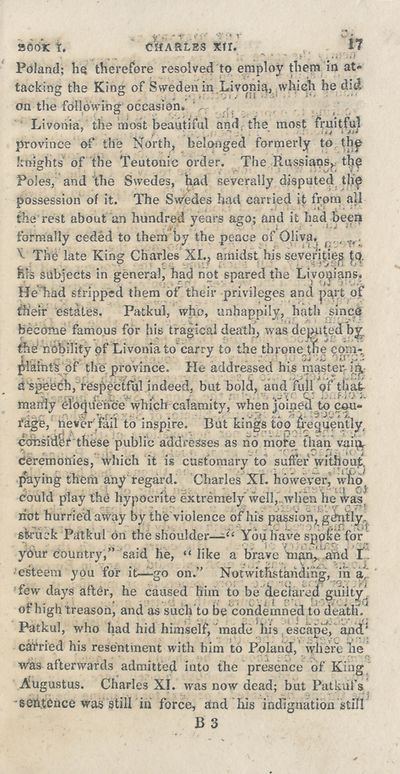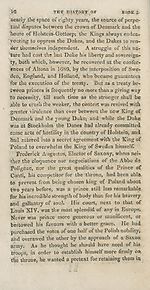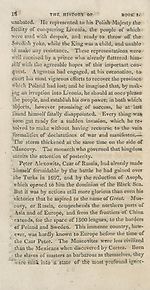Download files
Complete book:
Individual page:
Thumbnail gallery: Grid view | List view

BOOK t. CHARLES Xtl. 17
Poland; he therefore resolved to employ them in at¬
tacking the King of Swodenin Livonie, which he did
on the following occasion. ‘,
Livonia, the most beautiful and the most fruitful
province of the Jiforth, belonged formerly to thy
knights' of the Teutonic order. The Russians, tfyy
Poles, and ithe Swedes, had severally disputed thy
possession of it. The Swfedes had carried it from all
the rest about an hundred years ago; and it had been
formally ceded to them by the peace of Oliva. ( ..
X. The late King Charles XI.? amidst hjs severities Jq.
his subjects in general," had not spared the Livoyians.
He'Trad stripped them of their privileges and part of
th'eir estates. Patkul, who, unhappily, hath sinc0
become famous for his tragical death, was deputed by
thef ndbilify of Livonia to"carry to the throne the cqm-
^1'aintVpf the province. He addressed his master,-
d'speech, respectful indeed, but bold, and full of that
mardy elo<Jurence which calamity, when joipeil to cou¬
rage, never'fail to inspire. But kings too treqaently,
cdhsid^f these public addresses as no more than vain.
Ceremonies, which it is customary to suffer without.
Ikying them any regard. Charles XL however, wW
could play the hypocrite extremely well, when betas',
riot hurried away by the violence of ins passion, gCntly-
siruck Patkul 6n the shoulder—‘£ You have sppke for
y6ur Country,” said he, “ like a brave man, and f
esteem ypu for it—go on.” Notwithstanding, in a,,
few days after, he caused him to be ieclaivd gui 1 ty'
of high treason, and as such to tie'condemned,to death*.
Patkul, who had hid himself, made his escape! and’
carried his resentment with him to Poland, where he
was afterwards admitted into the presence of King
Augustus. Charles XI. was now dead; but PatkulY
sentence was still in force, and his indignation still
Poland; he therefore resolved to employ them in at¬
tacking the King of Swodenin Livonie, which he did
on the following occasion. ‘,
Livonia, the most beautiful and the most fruitful
province of the Jiforth, belonged formerly to thy
knights' of the Teutonic order. The Russians, tfyy
Poles, and ithe Swedes, had severally disputed thy
possession of it. The Swfedes had carried it from all
the rest about an hundred years ago; and it had been
formally ceded to them by the peace of Oliva. ( ..
X. The late King Charles XI.? amidst hjs severities Jq.
his subjects in general," had not spared the Livoyians.
He'Trad stripped them of their privileges and part of
th'eir estates. Patkul, who, unhappily, hath sinc0
become famous for his tragical death, was deputed by
thef ndbilify of Livonia to"carry to the throne the cqm-
^1'aintVpf the province. He addressed his master,-
d'speech, respectful indeed, but bold, and full of that
mardy elo<Jurence which calamity, when joipeil to cou¬
rage, never'fail to inspire. But kings too treqaently,
cdhsid^f these public addresses as no more than vain.
Ceremonies, which it is customary to suffer without.
Ikying them any regard. Charles XL however, wW
could play the hypocrite extremely well, when betas',
riot hurried away by the violence of ins passion, gCntly-
siruck Patkul 6n the shoulder—‘£ You have sppke for
y6ur Country,” said he, “ like a brave man, and f
esteem ypu for it—go on.” Notwithstanding, in a,,
few days after, he caused him to be ieclaivd gui 1 ty'
of high treason, and as such to tie'condemned,to death*.
Patkul, who had hid himself, made his escape! and’
carried his resentment with him to Poland, where he
was afterwards admitted into the presence of King
Augustus. Charles XI. was now dead; but PatkulY
sentence was still in force, and his indignation still
Set display mode to:
![]() Universal Viewer |
Universal Viewer | ![]() Mirador |
Large image | Transcription
Mirador |
Large image | Transcription
| Antiquarian books of Scotland > Kings & rulers > History of Charles XII, King of Sweden > (37) |
|---|
| Permanent URL | https://digital.nls.uk/115021454 |
|---|
| Description | Thousands of printed books from the Antiquarian Books of Scotland collection which dates from 1641 to the 1980s. The collection consists of 14,800 books which were published in Scotland or have a Scottish connection, e.g. through the author, printer or owner. Subjects covered include sport, education, diseases, adventure, occupations, Jacobites, politics and religion. Among the 29 languages represented are English, Gaelic, Italian, French, Russian and Swedish. |
|---|

